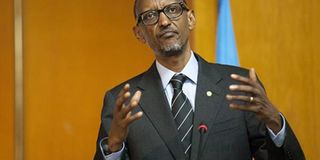Divisive technology trends have negative consequences

Rwandan president Paul Kagame
What you need to know:
- One of the highlights of such technology is the smart buses in Kigali where passengers “tap-and-go” using prepaid cards. The buses also have access to free internet.
- Transform Africa Summit is the annual African forum bringing together global and regional leaders from government, business and international organizations to collaborate on new ways of shaping, accelerating and sustaining Africa’s on-going digital revolution. President Museveni is expected to speak at the summit on Friday.
Kigali, Rwanda – The rising use of technology in Africa is noted to be concentrated in urban areas, often sidelining the largely rural population, creating what is known as a digital divide. This trend, if it persisted has the potential of creating another layer of inequality, which in itself has negative consequences. Speaking at the opening ceremony of the Transform Africa Summit 2017 in Kigali, Rwanda, President Paul Kagame warned that such divisive technology means that the continent is not on the right track.
“Access to technology must also not distinguish between rich and poor or between urban and rural areas. If technology is entrenching divide rather than equalizing opportunities then we’re not harnessing it well and there will be negative consequences to follow from that,” he said.
Technology, according to the Africa Smart Cities Blueprint, released during the summit, all-inclusive technology – in health care and better service provision – will promote the sustainable socio-economic development of societies.
“We must deliver on technologies that promise to bridge divides rather than deepen them. That begins with the digital gender divide. So long as women and girls are lagging behind, then we’re not on the right track,” Mr Kagame added.
The focus of this year’s Transform Africa 2017, is on “Smart Cities. Fast Forward”, inclined towards cities use to technology and data as part of their development agenda. African cities are less prosperous and disconnected, which means they struggle to become centres of growth, innovation, and opportunities.
Dr Hamadoun Toure, the Executive Director, Smart Africa Secretariat told delegates that it is technology that “will consistently usher Africa into a knowledge-based continent through ICT.”
That explains the development of the Africa Smart Cities Blueprint, which explains how cities in Africa can harness technology. It also explains the role of the private sector as taking lead with the government creating an enabling environment.
“This we believe will bring a favourable business climate that will transform Africa into smart societies. Technology will promote technology in cities across Africa and this we believe this will accelerate social economic development in cities,” Toure adds.
One of the highlights of such technology is the smart buses in Kigali where passengers “tap-and-go” using prepaid cards. The buses also have access to free internet.
Transform Africa Summit is the annual African forum bringing together global and regional leaders from government, business and international organizations to collaborate on new ways of shaping, accelerating and sustaining Africa’s on-going digital revolution. President Museveni is expected to speak at the summit on Friday.
[email protected]



